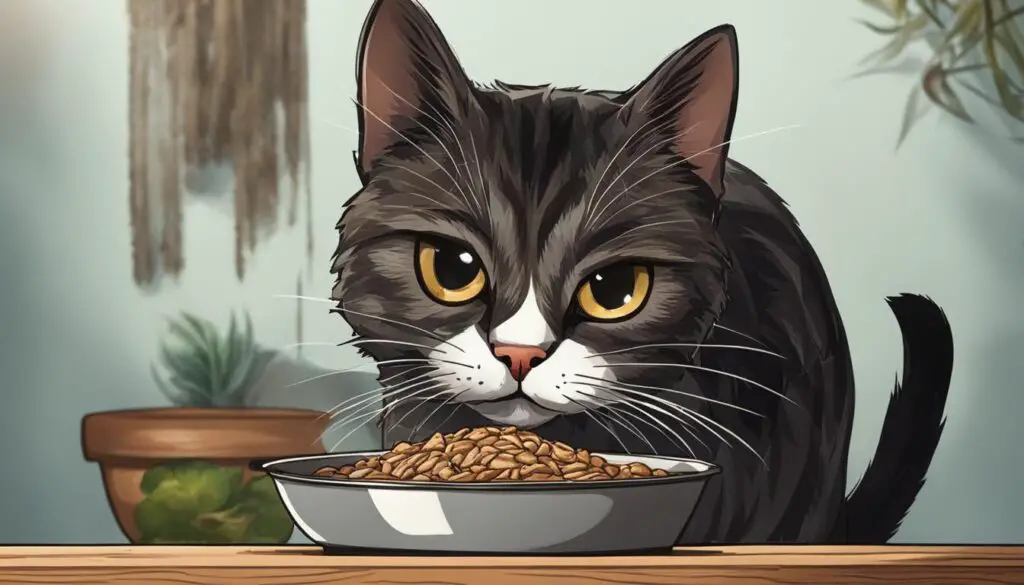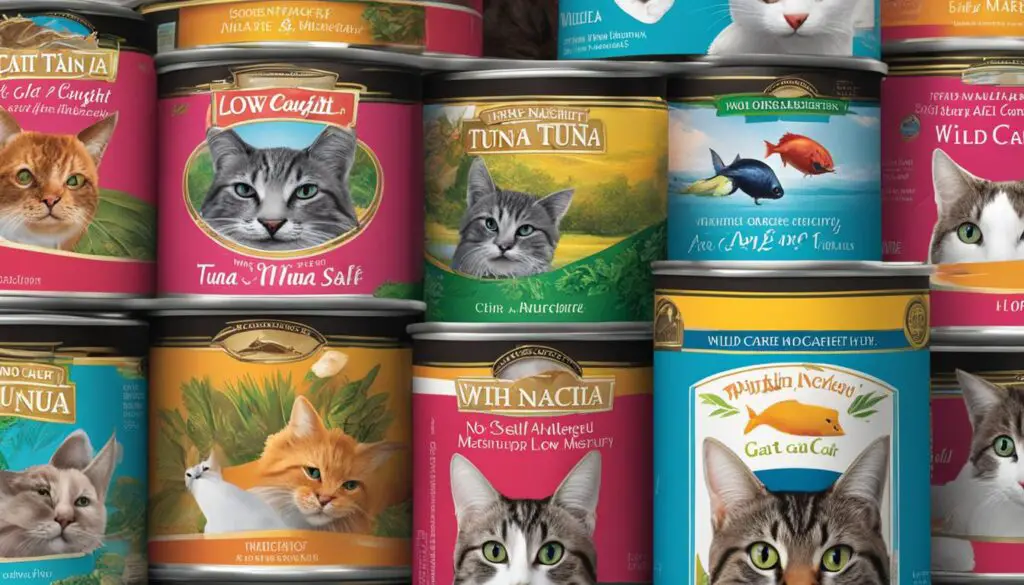Cats and tuna have a special relationship that has captivated feline enthusiasts for centuries. It is no secret that cats have a deep affinity for this fishy delight, but what exactly makes tuna so irresistible to our furry friends? Let’s explore the reasons behind cats’ love for tuna and unravel the allure of this savory seafood.
Research has shed some light on this feline obsession with tuna. Cats are equipped with taste bud receptors that can detect umami, the savory flavor found in meats. Taste tests have shown that cats are particularly drawn to compounds present in umami-rich foods, with a specific preference for those found in tuna. This affinity for tuna may have evolved over time, as depicted in ancient Egyptian art and observed in cats feasting on fish in Middle Eastern ports.
The appeal of tuna to cats lies in its high levels of umami flavor and compounds like histidine and inosine monophosphate. These elements enhance the taste experience for cats and trigger their innate love for this delectable fish.
Key Takeaways:
- Cats have a biological preference for tuna due to their taste bud receptors that detect umami.
- Tuna’s high levels of umami flavor and compounds like histidine and inosine monophosphate make it irresistible to cats.
- Observations in ancient art and historical accounts highlight cats’ longstanding fascination with tuna.
- Understanding cats’ tuna obsession can help improve cat food formulas and develop medications for feline health.
- Research continues to unveil the mysteries behind the relationship between cats and tuna.
Cats and Tuna: Safety Concerns and Risks of Feeding Cats Tuna
When it comes to feeding cats, tuna is often a popular choice. However, it is important for cat owners to be aware of the safety concerns and risks associated with feeding cats tuna. While cats can eat tuna, it should only be given in moderation and with caution.
One of the main safety concerns with cats eating tuna is the potential for mercury exposure. Tuna, especially certain types like albacore, can contain high levels of mercury. If consumed excessively, this can lead to mercury poisoning in cats, which can have serious health implications. Therefore, it is crucial to limit the amount of tuna given to cats and ensure it is not their primary source of nutrition.
“Feeding cats tuna as a main meal may result in nutritional imbalances and deficiencies, as tuna lacks essential nutrients required for their overall health.”
Additionally, canned tuna for humans may have added salt and seasonings that can be harmful to cats. These additives can negatively impact a cat’s health, leading to issues such as dehydration or kidney problems. It is important to choose plain tuna packed in water without any added salt or seasonings to minimize these risks.
Safe alternatives to feeding cats tuna:
- Include a variety of protein sources in a cat’s diet, such as chicken, turkey, beef, and lamb.
- Feed specially formulated cat food that meets all the nutritional needs of cats.
- Consult with a veterinarian to ensure a cat’s diet is balanced and appropriate for their specific health needs.
By being aware of the safety concerns and risks involved, cat owners can make informed decisions when it comes to feeding cats tuna. Remember, it is always best to consult with a veterinarian for personalized advice and guidance on providing a balanced and healthy diet for your feline companion.
Safety Concerns with Cats Eating Tuna

While many cats have a strong affinity for tuna, it is important to be aware of the safety concerns associated with feeding them this popular fish. Cats can eat tuna, but it should be given in moderation and under certain conditions to ensure their well-being. Here are some important considerations to keep in mind when it comes to cats and tuna.
The Risks of Feeding Cats Tuna
“Tuna can contain high levels of mercury, which can be harmful to cats if consumed excessively,” warns Dr. Lisa Johnson, a renowned veterinarian. “Mercury poisoning can lead to neurological damage in cats and can have serious health implications.”
In addition to mercury, canned tuna for humans may have added salt and seasonings that can negatively impact a cat’s health. This is why it is crucial to choose plain tuna packed in water without any additional ingredients. Tuna packed in oil can also cause digestive issues for cats, so it is best to avoid this type of tuna altogether.
Feeding Tuna Responsibly
It’s important to remember that tuna should not be the main meal for cats. Feeding them tuna as a primary source of nutrition may result in nutritional imbalances and deficiencies. Cats require a well-balanced diet that includes all the essential nutrients they need to thrive. While tuna can offer some nutritional benefits, it is best to feed cats specially formulated cat food that meets their unique dietary requirements.
However, if you choose to give your cat the occasional treat of tuna, make sure it is plain tuna packed in water and limit the amount you provide. Feeding cats tuna responsibly means understanding the potential risks and ensuring it is given in moderation, as part of a varied diet that includes other protein sources and essential nutrients.
- Provide plain tuna packed in water as an occasional treat
- Avoid tuna packed in oil or with added salt and seasonings
- Feed cats a well-balanced diet that meets their nutritional needs
- Consult with a veterinarian for personalized advice
By following these guidelines and understanding the safety concerns associated with cats and tuna, you can ensure that your feline friend enjoys the occasional tuna treat while maintaining their overall health and well-being.
Potential Benefits of Cats Eating Tuna
While it is important to feed cats tuna in moderation and as part of a balanced diet, there are potential benefits that it can offer to our feline friends. Tuna is a good source of protein, which is essential for cats as obligate carnivores. Protein helps support muscle development, growth, and overall body strength in cats. Additionally, tuna contains omega-3 fatty acids, which are known to promote healthy skin and a shiny coat, giving cats that lustrous and sleek appearance we love.
Tuna is also rich in important vitamins and minerals that contribute to a cat’s overall health and well-being. It is a natural source of vitamin D, which plays a crucial role in calcium absorption and maintaining strong bones in cats. Vitamin B12, found in abundance in tuna, supports the formation of red blood cells and helps maintain a healthy nervous system. Furthermore, tuna is a good source of potassium, an essential mineral that aids in proper heart and muscle function in cats.
Feeding cats tuna can also provide them with additional hydration. Cats are known for being picky drinkers, and some may not consume enough water to meet their daily needs. Tuna, with its high moisture content, can help keep cats hydrated and prevent issues like urinary tract problems.
While the nutritional benefits of tuna for cats are significant, it is important to remember that tuna should not be the sole source of nutrition for cats. It lacks certain essential nutrients like taurine, which is crucial for their heart health. It is best to offer tuna as an occasional treat and provide cats with a well-balanced diet that meets all their nutritional requirements. Consulting with a veterinarian is always recommended to ensure that a cat’s dietary needs are being met and that their health and well-being are prioritized.
Nutritional Considerations for Cats Eating Tuna
Feeding cats tuna can be a tempting choice due to its taste and appeal, but it is important to consider the nutritional implications. While tuna can provide cats with protein and omega-3 fatty acids, it should not be their primary source of nutrition. Tuna lacks essential nutrients like taurine, which is crucial for a cat’s heart health. Additionally, tuna can contain high levels of mercury, which can be harmful to cats when consumed excessively.
Feeding cats solely with tuna cans can lead to nutritional imbalances and deficiencies. Cats require a balanced diet that includes a variety of protein sources, vitamins, minerals, and other essential nutrients. It is best to consult with a veterinarian to determine the appropriate diet for your cat and ensure their nutritional needs are being met.
The Risks of Feeding Cats Tuna
While tuna can be a tasty and occasional treat for cats, it is important to be aware of the risks. The high mercury levels in tuna can lead to mercury poisoning if cats consume large quantities. This can cause symptoms such as neurological issues, muscle weakness, and even organ damage.
Tuna lacks certain essential nutrients, such as taurine, which is crucial for a cat’s heart health. A diet solely based on tuna cans can result in taurine deficiency, leading to serious heart problems in cats.
Additionally, feeding cats only tuna can create a dependency on this particular food, making it difficult for them to transition to a balanced diet. This can lead to a limited variety of nutrients and increase the risk of nutritional deficiencies.
Nutritional Implications and Responsible Feeding
To ensure your cat’s health and well-being, it is essential to provide them with a nutritionally balanced diet. While tuna can be included as an occasional treat, it should not replace a complete and balanced cat food. Commercially available cat food brands offer a wide range of options that meet all the nutritional needs of cats.
- Consult with a veterinarian to determine the best diet for your cat’s specific needs.
- Choose cat food that is specially formulated to provide the right balance of nutrients.
- Introduce new foods gradually to avoid digestive issues.
- Monitor your cat’s weight and overall health regularly.

Alternatives to Feeding Cats From Tuna Cans
While cats may have a strong attraction to tuna, it is important to explore alternatives to ensure they receive a balanced diet. Feeding cats a variety of protein sources can provide them with different flavors and textures, while still meeting their nutritional needs. Consider incorporating chicken, turkey, beef, or lamb into their meals. These options not only offer essential nutrients but also provide a diverse range of nutrients that can support overall health and well-being.
Commercially available cat food brands also offer a wide range of options to ensure cats receive proper nutrition. These cat foods are specifically formulated to meet the nutritional needs of cats and often contain a balanced blend of proteins, carbohydrates, and essential vitamins and minerals. Consulting with a veterinarian can also provide valuable guidance in selecting the right cat food for your feline friend.
Remember, maintaining a balanced diet is crucial for cats’ overall health. While tuna can be enjoyed as an occasional treat, relying solely on tuna cans for their nutrition can lead to imbalances and deficiencies. By exploring healthy alternatives and providing a well-rounded diet, cat owners can ensure their furry companions receive the essential nutrients they need to thrive.
Consider the following when exploring alternatives to feeding cats tuna:
- Introduce a variety of protein sources, such as chicken, turkey, beef, or lamb.
- Choose commercially available cat food brands that offer a balanced blend of nutrients.
- Consult with a veterinarian to ensure your cat’s specific nutritional needs are met.
- Provide a well-rounded diet to prevent nutritional imbalances and deficiencies.
Feeding Cats Tuna Responsibly
Feeding cats tuna can be a delightful treat for our feline friends, but it’s important to do so responsibly. While cats are known for their love of tuna, it should not be the mainstay of their diet. Instead, tuna should be given in moderation as an occasional treat to ensure that cats receive a balanced diet that meets their nutritional needs.
When offering tuna to cats, it’s crucial to choose the right type. Plain tuna packed in water, without any added salt or seasonings, is the safest option. This ensures that cats are not exposed to potential health risks associated with additives. Additionally, it’s essential to feed cats a variety of foods to provide them with a balanced diet. Alongside tuna, include other protein sources like chicken, turkey, beef, and lamb to offer a range of flavors and textures.
To ensure the optimal health and well-being of our furry companions, consulting with a veterinarian is essential. They can provide personalized guidance on introducing tuna into a cat’s diet, taking into account any specific health considerations. Veterinarians can also help determine the appropriate frequency and portion size of tuna treats to avoid nutritional imbalances and deficiencies.
Introducing Tuna into a Cat’s Diet
Adding variety to a cat’s diet can be beneficial to their overall health and enjoyment. If you’re considering introducing tuna to your cat’s diet, it’s important to do so responsibly and safely. Here are some tips to help you incorporate tuna into your cat’s meals:
Consult with a Veterinarian
Before making any changes to your cat’s diet, it’s always best to consult with a veterinarian. They can assess your cat’s unique nutritional needs, any existing health concerns, and provide personalized advice tailored to your cat’s specific requirements. They will be able to guide you on whether introducing tuna is appropriate and how to do it safely.
Start Slowly and Monitor for Any Reactions
When introducing any new food to your cat, including tuna, it’s important to start slowly. Begin by offering a small amount of plain tuna packed in water as a treat or mix a small portion with their regular cat food. Observe your cat’s reaction and monitor for any signs of digestive upset or allergies. If your cat shows any adverse effects, discontinue feeding them tuna and consult with your veterinarian.
Use High-Quality Tuna and Proper Portions
When selecting tuna for your cat, choose high-quality options that are plain, packed in water, and without any added salt or seasonings. Ensure the tuna is safe for feline consumption and free from potential contaminants. Additionally, it’s important to feed tuna to your cat in moderation. It should only be a small part of their overall diet to avoid nutritional imbalances and deficiencies.

Consider Alternative Protein Sources
While tuna can be a tasty treat for your cat, it shouldn’t be their sole source of protein. Cats require a well-balanced diet that includes a variety of protein sources to meet their nutritional needs. Consider including other protein options such as chicken, turkey, beef, or lamb in their meals. This will provide your cat with a diverse range of nutrients and flavors to keep them satisfied.
By following these guidelines and consulting with your veterinarian, you can safely introduce tuna into your cat’s diet and provide them with a flavorful and varied eating experience.
Choosing the Right Tuna for Cats
When it comes to choosing tuna for your feline companion, it’s important to make the right decisions to ensure their safety and well-being. Here are some key considerations:
- Opt for plain tuna packed in water: This is the safest choice for cats as it avoids added salt or seasonings that can be detrimental to their health.
- Avoid tuna packed in oil: Tuna packed in oil can lead to digestive problems for cats and contribute to obesity. Stick to water-packed options.
- Check the label: Make sure the tuna you choose doesn’t contain any additional ingredients that could harm your cat. Always read the label carefully.
By selecting the right type of tuna for your cat, you can ensure their enjoyment of this occasional treat without compromising their health. Remember, moderation is key when it comes to feeding cats tuna, and it should never replace a balanced diet specifically formulated for their nutritional needs.
“Choosing the right tuna for cats is essential to provide them with a safe and enjoyable treat. Opting for plain tuna packed in water and avoiding added salt or seasonings will help keep your cat healthy and happy.” – Dr. Emily Johnson, Veterinarian
By following these guidelines and consulting with your veterinarian, you can make informed choices when it comes to incorporating tuna into your cat’s diet. Choosing the right tuna ensures that your feline friend receives the nutritional benefits they need while minimizing any potential risks.

Conclusion
Cats’ love for tuna is truly extraordinary. While we may never fully understand the exact reasons behind their feline fascination with tuna, scientific research has provided valuable insights into this intriguing behavior. From ancient Egyptian art to cats feasting on fish in Middle Eastern ports, the historical and evolutionary connections between cats and tuna are undeniable.
It’s important for cat owners to be aware of the safety concerns and nutritional considerations associated with feeding tuna to their furry companions. While tuna can offer some benefits, such as being a good source of protein and omega-3 fatty acids, it should only be given in moderation as an occasional treat. Cats require a balanced and varied diet to thrive, and relying solely on tuna cans can lead to nutritional imbalances and deficiencies.
By choosing plain tuna packed in water without any added salt or seasonings, and feeding it responsibly and in moderation, cat owners can ensure that their beloved feline friends can savor the occasional delight of tuna while maintaining their overall health and well-being. So, the next time you treat your cat to a special snack, consider the allure of tuna and the joy it brings to their curious taste buds.
FAQ
Why do cats love tuna?
Cats have a strong affinity for tuna due to their ability to detect umami, the savory flavor found in meats. Tuna’s high levels of umami flavor and compounds like histidine and inosine monophosphate make it particularly appealing to cats.
Can cats safely eat tuna?
Cats can eat tuna, but it should only be given in moderation. Tuna often contains high levels of mercury, which can be harmful if consumed in large quantities. It is best to feed cats specially formulated cat food to ensure their nutritional needs are met.
What are the safety concerns with cats eating tuna?
Tuna can contain high levels of mercury, which can lead to mercury poisoning in cats if consumed excessively. Feeding cats tuna as a main meal may result in nutritional imbalances and deficiencies. It’s important to choose plain tuna packed in water without any added salt or seasonings and feed it to cats in moderation.
What are the potential benefits of cats eating tuna?
Tuna is a good source of protein, omega-3 fatty acids, and important vitamins and minerals that support a cat’s overall well-being. It can also provide cats with additional hydration.
What are the nutritional considerations for cats eating tuna?
While tuna can provide some nutrients, it should not be the primary source of nutrition for cats. Tuna lacks essential nutrients like taurine, which is crucial for a cat’s heart health. Feeding cats specially formulated cat food that meets all their nutritional needs is recommended.
What are the alternatives to feeding cats from tuna cans?
Chicken, turkey, beef, and lamb are viable protein sources that can provide cats with a variety of flavors and textures. It is important to provide cats with a complete and balanced diet that includes all the necessary nutrients.
How should cats be fed tuna responsibly?
Tuna should be given in moderation as an occasional treat, not as a main meal. It should be plain tuna packed in water, without added salt or seasonings. Feeding cats a balanced diet that includes all the necessary nutrients and consulting with a veterinarian are essential.
How should tuna be introduced into a cat’s diet?
Before introducing tuna or any new food into a cat’s diet, it is recommended to consult with a veterinarian. They can provide guidance on whether it is safe for a cat’s specific health needs and help make informed decisions regarding their nutrition.
How can the right tuna be chosen for cats?
It is crucial to select plain tuna packed in water, without any added salt or seasonings. Tuna packed in oil or with added salt should be avoided, as it can cause digestive issues and contribute to obesity in cats.
Can cats rely solely on tuna cans for their nutrition?
Cats should not rely solely on tuna cans for their nutrition, as it can lead to nutritional imbalances and deficiencies. Feeding cats specially formulated cat food that meets all their nutritional needs is the best way to ensure their health and well-being.

